A group photo including the industry leaders and academic experts who attended the 1st day of workshop
“What ingredients do we need for our dish?” Dr. Francis F. Tusubira
The School of Engineering at the College of Engineering, Design, Art and Technology (CEDAT) has hosted a 2-day Expert Group workshop from 14th-15th April 2025 with the participation of the academia, and industry representatives
Dr. Roseline Akol, who kick started the workshop with the opening remarks acknowledged that Makerere university was not in the race alone and neither was it a sole trainer since other universities are also training in engineering and hence the need for collaboration. She also stated that there has to be a collaboration with industries because they have the ability to cause change through their research and development, feedback, industrial training and others. As a research led university, Dr. Roseline Akol said that Makerere wants to enhance knowledge generation, access and innovation for basic and applied research. “We want to go beyond innovation and maximize research by translating it into tangible works that is products and resources that can impact the community”, said Dr. Roseline Akol. She stated that most of the research conducted and the good reports written by the university students remains in shelves and was not being translated into a tangible products , and that this was the reason as to why Makerere University wanted to provide support to the researchers to attract funding from international sources through the project.
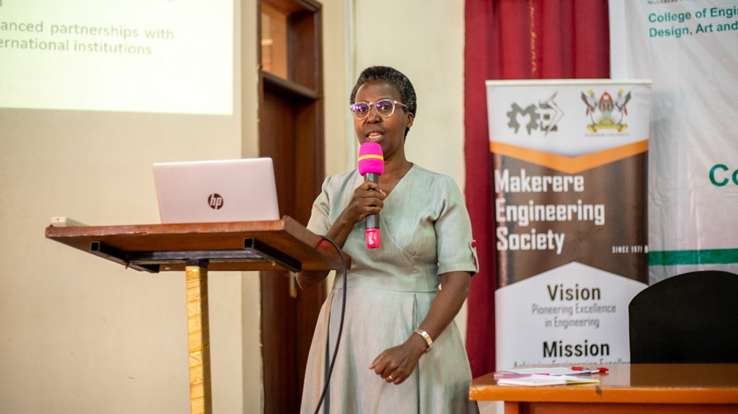
“A recipe needs a lot of ingredients to make a delicious dish, therefore, you have to know which ingredients are required. That same thing happens with the curriculum because if we are talking about creating sustainable learning for our students who are living in the world where technology is changing very fast, they must be equipped with a lot of skills beyond the traditional skills. We have to get different ingredients that is social sciences, botany and others into our curriculum rather than saying that they don’t apply to us”, said Dr. Francis F. Tusubira, one of the key note speakers. As the keynote speaker, he called upon his fellow engineers to avoid being “arrogant” and learn to appreciate the contributions of other sectors towards the enhancement of the curriculum since they are all possible ingredients for a right curriculum.
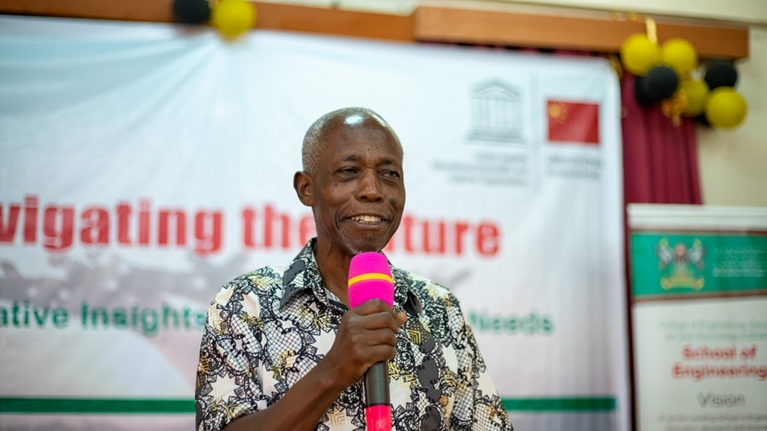
Dr. Tusubira proposed that innovations should not only be done in the final year projects but rather start in the first year to allow the students show their innovative skills that would help them to identify talents and direct such talents to the right direction. He also said that as technology gets closer and closer, ethical issues start to be abused yet they are core values and have to be considered.
“We need to start with real willingness at both personal and institutional level to make a real change” Dr. Francis F. Tusubira noted. The workshop also had a panel discussion on “Bridging the skills Gap” that was moderated by Eng. Andrew Ayor. The discussion hosted different panelists from the academia and industry that is Eng. Counsel Peterson Mwesiga representing the academia, Dr. Catherine Wandera and Eng. Fiona Korukiko Gumisiriza representing the industry. These discussed various insights on bridging the skills gap. “The quality of our work determines how urgent we need the skills. The biggest efficiency we have are hands-on skills for engineers” Dr. Catherine Wandera noted.
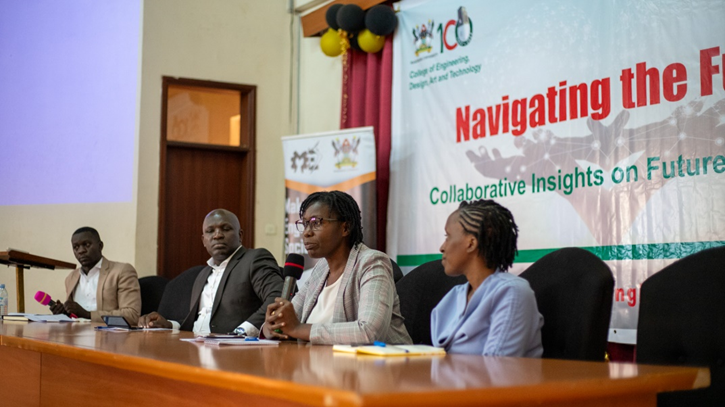
According to Eng. Fiona Korukiko Gumisiriza, graduates lack problem solving skills. They don’t know how to apply all the good knowledge obtained to solve a problem”. Just like Dr. Tusubira had stressed before, Eng. Counsel Peterson Mwesiga also called upon his fellow engineers to seek help from other sectors and not to rely on themselves alone. “Let us learn to seek help in other sectors like the intellectual property, accounts, and others and learn to say ‘I don’t know’”.
Dr. Donna Namujju, while addressing the objectives of the EGFSN urged her fellow experts to embrace collaboration and appreciate the Uganda’s National Development Plan IV (NDP IV) and Vision 2040 in order to operate the EGFSN. “As higher education institutions, we cannot operate in isolation. We must put in place programs that align with the development goals that therefore bring into play the EGFSN”, she noted. Dr. Namujju also stressed that structured dialogue should be done between the industry and academia so that program development is co-owned and also close the employability gap.
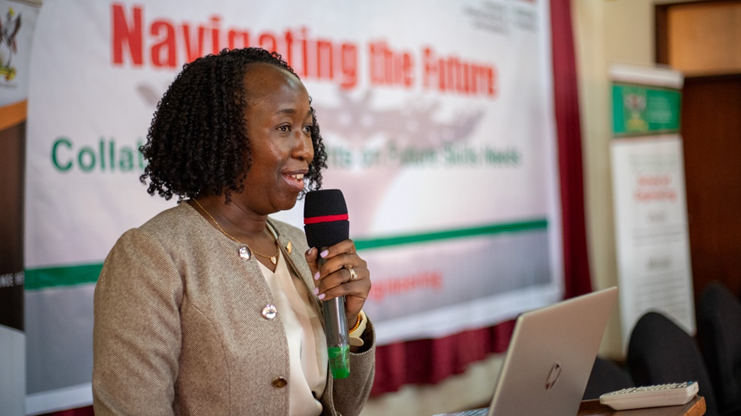
The first day of the workshop was later on wrapped off with a working session that was done in groups which later after the discussion did a presentation for their work. While in their groups, the experts joined together their knowledge to identify the gaps that existed in the engineering curriculum at Makerere and identify current and future skills requirements within the engineering field.
The first group which was headed by Dr. Catherine Wandera identified the gaps in the curriculum which included limited internship and internship tools, lack of skills in using digital tools, installation skills, lack of exposure to engineering system, lack of project management skills, lack of value addition to the industry, lack of industry guest lectures, , inadequateg focus on knowledge attained during assessment, poor ICT skills, the lack of mentors, and lack of communication between government and academia.
The second group, which was headed by Dr. Donna Namujju identified the skills that the group divided into various categories which among others included; Technological skills that is; automation and scripting, cyber security, ability to modify AI in problem solving and training AI tools with local context data. Manufacturing skills that is; product design, production process design, machining, 3D printing, and computer aided design. Soft skills that is; task oriented problem solving, and scenario based evaluation and lastly Facilitators that is; business incubation centers, and regulatory policies for responsible AI.
In conclusion, the day was summarized into three parts that is Curriculum reform where the experts were urged to be versatile and approach the curriculum with boldness, Triple collaboration whereby the industry, government and academia were tasked to build stronger relations and intentional about imbedding academia in industry and government however, a strong collaboration within the academia should come first besides the government and industry finding the academia trustworthy. Lastly, soft skills also stood out as a crucial issue highlighting arears of creative thinking, curiosity and many more. All this is aimed at laying the foundation for the formation of a successful Expert Group, ultimately strengthening the School of Engineering contribution to addressing industry challenges, bridging skills gaps, and enhancing the preparedness of the students and graduates for impactful careers.
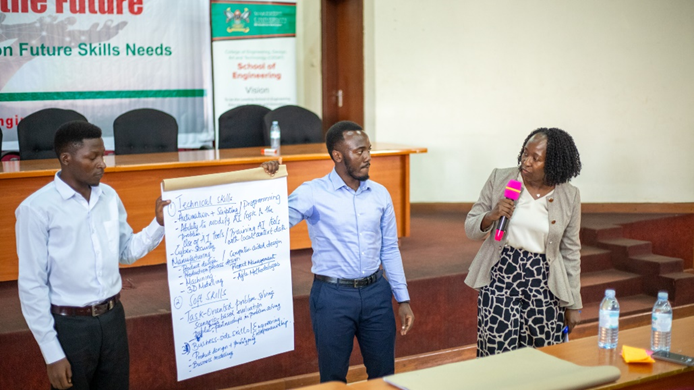
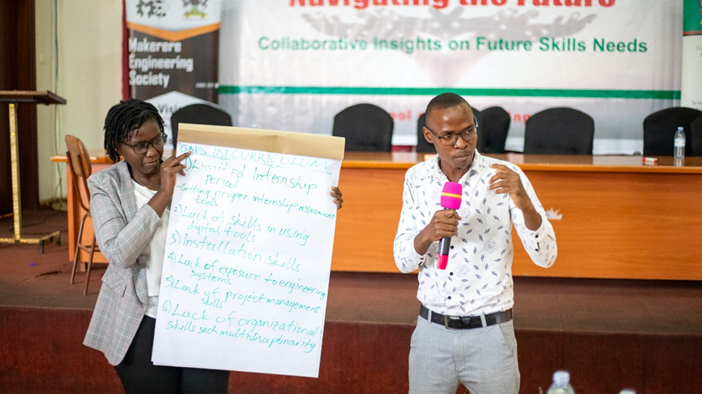
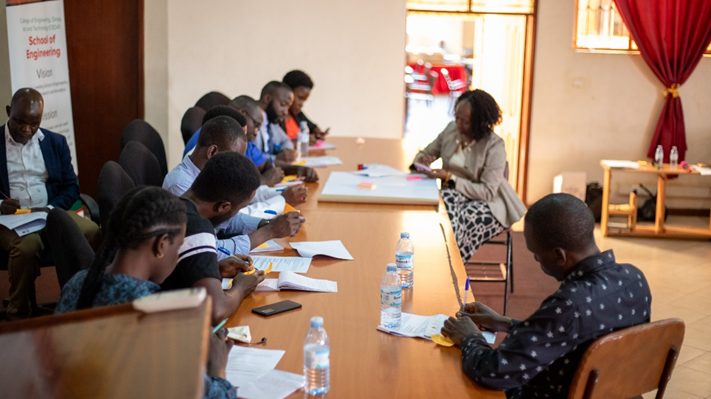
Article by
Gloria Kabazazi, Communication Student
